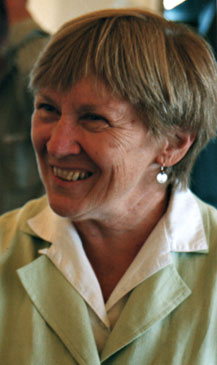 |
| Rep. Linda Rogers McKee of Wayne told Fairgoers at a Common Ground Country Fair Teach-In that “preparation is key” to getting a bill before a committee. English photo. |
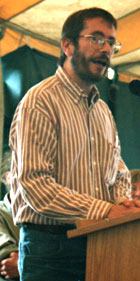 |
| Rep. Paul Volenik of Brooklin said that “Maine is one place where you can still make a difference.” English photo. |
Public Policy Teach-In at Common Ground
How much power does Big Business have, compared with the people, to impact the Maine legislature? That question was foremost on many MOFGA members’ minds last March, when MOFGA was involved with its busiest legislative session ever and when Big Business in the form of the biotech industry seemed to wield undue power.
“MOFGA took a position on seven bills this year,” explained MOFGA board member and public policy committee chair Sharon Tisher at a Teach-in at the Common Ground Country Fair last September. One bill in particular, which dealt with cross contamination of non-genetically engineered (GE) crops by GE crops, raised the question of influence. After MOFGA’s cross contamination bill was unanimously voted “ought to pass” by the Legislature’s Joint Standing Committee on Agriculture, Conservation and Forestry, “lobbyists for the biotech industry and one legislator who was not on the Committee were very upset about the bill,” said Tisher. “They went to work” and managed to get 10 committee members to change their minds about the bill. “They were ready to bring the bill back and change or kill it,” said Tisher. “We showed up at the Legislature prepared for the funeral of this bill, but we ended up in a back room … negotiating for five hours. Even- tually we came out with a bill we were happy with. But [the process] raised many questions” about power. That power – and how ordinary citizens can use their own power – was addressed by six people who were involved in the last legislative session and who are long-time MOFGA members.
Understand the Process
Rep. Linda Rogers McKee, from Wayne, co-chairs the Agriculture Committee. She was one of the prime introducers and sponsors of the “first in the country, first in the world” cross contamination bill, and one of the first MOFGA members (she ran a market garden for 10 years). She said that she is particularly pleased to represent the sustainable agriculture community in the Legislature.
Citing the fact that each bill introduced to the Leg- islature costs about $25,000, McKee stressed the importance of understanding the process by which a law is made. She urged citizens to get a copy of the House Register, the Roster (which shows where people sit in the Legislature, so citizens can find, recognize and talk with them as they leave the room), and the pamphlet “Pathways to Legislation.” To help citizens become more involved, Maine has a new Citizens’ Center – as a result of legislation that McKee intro- duced. This Center, as you walk in on the west end of the State House, educates citizens on how to lobby and be on a level playing field with paid, industry lob- byists. It tells how not to be intimidated when you testify about a bill. Citizens can get copies of bills and information relating to bills here.
“Preparation is key,” said McKee. “Knowing the ins and outs of the Legislature is critical. Make sure you have contacted your representative in your community to let him know what’s going on,” even if that representative is not on the committee that is considering a particular bill. “If your presence is preceded by a newspaper article or letter to the editor, all the better. The more information that legislators have, the more likely your bill will be heard.” She added, “Bill Cohen once told me that if he got 10 phone calls on any one issue, he’d call a press conference.”
She urged flexibility as a bill is heard. “I like to take giant steps in life, but it doesn’t happen that way in a democracy.”
McKee emphasized the importance of being at hearings. “Your presence is important.” She was very impressed with the “two rooms full of people at the GE hearings. It was a thoroughly enlightened, informed group. It was delightful to hear them speak. They were not in the halls in your face, waving signs, yelling … And they all looked so healthy!”
You must have the energy for the whole legislative process, she continued. “Be there for the long haul,” as were “two delightful, elderly women at the GE labeling bill hearing.” They were elegantly dressed, soft spoken, well informed, “and they gained entrance to more conversations than I’d ever seen.”
You Can Make a Difference
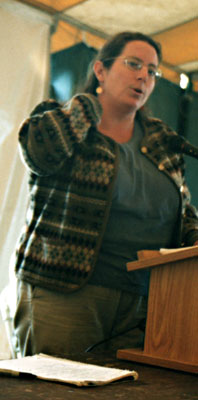 |
| Evelyn deFrees, a former lobbyist for the Natural Resources Council of Maine, encouraged activists to form networks to share the work of lobbying and to keep up pressure on the legislature. English photo. |
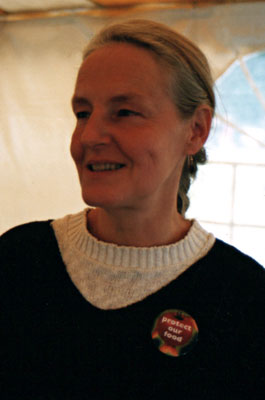 |
| Leslie Cummins of Brooklin is one of the founders of Co-op Voices Unite, which represented thousands of Maine co-op members and an estimated $7 million market at hearings on genetic engineering. English photo. |
Paul Volenik of Brooklin, a member of the Agriculture Committee and sponsor of a bill requiring mandatory labeling of GE foods (which did not pass), spoke next about a world of haves and have nots; of those with power and those without; of those who control gov- ernments and those who don’t; of a business mentali- ty in which, “when the going gets tough, corporations move to Mexico.”
Despite these trends, “Maine is one place where you can still make a difference,” said Volenik. “Referendums are still doable. You can email your governor and you may get an answer. You can begin sweatshop legislation in one city, and it can become state law.”
He reiterated the points made by McKee, adding that “written [testimony] is good, but spoken is better, especially if it draws the legis- lators in with a good story, new information or a new slant.”
Organize others to speak and give them rides, he continued. Attend follow-up legislative work sessions. Walk the halls of the State House. “It’s your State House.” Organize a permanent lobbying effort for your cause(s).
Expand your goals, he added, by helping get good people to run for office, or by running yourself. “At the national level, corporate money ensures that can- didates from both parties tow the corporate line. It’s time to learn a lesson from those corporations. It’s time the people put up candidates in all parties. Let’s take over the political campaigns. Imagine two, three or more choices where each candidate represents the people!
“If the task looks too difficult,” he concluded, “remember the ancient Taoist tradition of public service. The Taoist hermit would leave his mountain retreat to serve the people for a time – not for riches or power, but simply to serve. When it was time, he would walk away from governing and return to his hermitage. Governing for the people need not last a lifetime nor destroy your soul. As I enter my eighth and final year in the Legislature, I believe I’ve helped do good things for the people. I look forward to returning to my hermitage by the sea.”
A Continuous Education Process
Conrad Heeschen of Wilton served in the Legislature from 1988 to 1996 and cosponsored the first GE labeling bill in 1994-1995. “It’s a continuing puzzle to me why we don’t have GE labeling,” he said, “especially when you have two rooms packed” with citizens testifying in favor of it. “It’s such a clear public concern and is so clearly in the public interest to have this food labeled. Why can’t we get it passed?”
Part of the answer, he said, is that “I’ve never seen so much dis/misinformation and lies from the oppo- nents than I’ve seen with any other issue in the Legis- lature. We had people testifying who were telling things I knew weren’t true. People [veterinarians, nutritionists] who were not revealing their ties to the industry.”
Also, farmers from northern Maine have been told that GE [potatoes] were the answer to their future. People from the Waterville-Fairfield area were told that they needed to promote the biotech industry – even though the industry in their area relates to research and medical issues, not to GE food. “Somehow they felt that having GE food labeled would cripple the biotech industry in the state.”
Opposition from the Maine Department of Agriculture didn’t help. “The first year, a slew from the Department of Agriculture and even some Ag Committee people were flown to St. Louis by Monsanto to see what great things were happening.”
Heeschen believes that the term limit law has hurt ordinary citizens and grassroots campaigns more than it’s hurt anybody else. When a committee has a turnover of members, “you have to learn everything all over again; the people there don’t know you.” Lobbyists, on the other hand, are paid to be there all the time with their message that “genetic stuff is good.” They can take the time to know everybody and talk with them.
“We need to keep pushing this issue” of genetic engineering, he concluded. Getting good people involved and continuing to communicate are key issues. “Most legislators look to see which way the wind is blowing before they vote. You need to have something in bill form, or the Legislature will pay no attention to the issue. You need to have bills there every year, every session, so that it’s a continuous edu- cation process.”
Build Coalitions
Evelyn deFrees was with the Natural Resources Council of Maine for 10 years, six of them running the NRCM lobbying program, before taking a break to be with her baby. While with NRCM, she found that “we needed networks of citizen activists” in addition to her, “to make sure there was always outside pressure at the State House.”
She said that we’re lucky in Maine because our legislators are so accessible and because we can, very likely, know our legislators – especially our numerous representatives. These legislators have no staff; they handle their mail and phone calls themselves. “So if you’re a citizen lobbyist, that meant I could go talk to the legislators. If you’re from the legislator’s district, that’s the most powerful of all.”
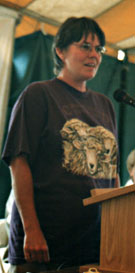 |
| Lori Conner of Deer Isle was concerned about many issues and decided to pick one – genetic engineering – and work on it. One of her tactics at hearings about GE issues was to stand around “posturing” like the corporate lobbyists until her presence had an effect on them. English photo. |
She urged that people put together broad coalitions to help divide the work of letter writing, phone calling, testifying, and personal meetings – the latter being “invaluable.” She said that in Maine, five letters on a subject is considered a “flood of people.” Tenacity and patience are critically important, and, because “democracy is messy, it absolutely helps to have a sense of humor.” Finally, to level the playing field, she said to learn about the clean elections law and be proud of your legislators who are running clean elections.
Your Presence is Effective
Lori Conner of Deer Isle spoke as a member of the public and of Maine Right to Know (which is pushing for GE labeling), and as someone who sat in on the five-hour negotiations on GE drift legislation by, according to Sharon Tisher, “just inviting herself into the room, which a bunch of others did, which we were delighted with.”
Conner said that two years prior, she was not an activist but was fired up about a lot of issues. She decided to pick one and do something about it, so she went to a Green Party meeting about genetic engineering. “I heard CR Lawn and Toby Kiers speak. I got fired up and hooked up with Maine Right to Know.” She worked on the organization’s referendum to require labeling of GE foods, helping get 1000 people “absolutely committed to being at the polls to collect signatures on November 7th. We’ re lucky in Maine that we can do a citizen’s referendum.”
Unfortunately, the Attorney General’s office rewrote the labeling question in a form that was sure to lose, so Maine Right to Know “decided to back off.” Instead, members participated in the legislative session. “Until then, I’d never been to the State House. Initially I was not pumped up about it, but to hear people speaking so eloquently … in those packed hearings … from their hearts, but also from a really solid base of knowledge. Monsanto had flown in corporate lawyers. I felt pretty intimidated by those guys, so I decided I’d stand close to them, stand around posturing like them … till one asked, ‘Can I help you with something?’ I said, ‘No, I’m just standing around like the rest of you, waiting for this to get going.’ You do see where your presence can have an effect.”
Co-op Members’ Lobbying Group
Leslie Cummins of Brooklin is a founding member of Co-op Voices Unite, which rep- resents about 5,000 food co-op members in Maine and a market of at least $7 million. It has worked for almost three years with the Blue Hill Food Coop and other coops, the Green Party, the Peace and Justice Center and the local library to inform citizens about genetic engineering. It has sponsored talks and published a packet of information. Some of its work has been funded through the Maine Initiatives Harvest Fund. “We want to inspire people, to empower them,” said Cummins. “We want to go on as a lobbying group for a long time. We hope the legislature gets to know us and that we can be of service to them.”
In addition to organizing a busload of people who came to the GE hearings, Cummins herself witnessed the negotiation session relating to GE drift legislation. “After two hours of the work session hearing,” she said, “it finally occurred to me that it was happening in the hall. There they were, a whole mess of people milling around. They had just decided to retire to a private room. I looked at one of the members of our group and saw incredible determination on her face. She was going into that room and nothing was going to stop her. I didn’t know if this was legal … We all kept looking at Sharon, and she said, ‘We’re going,’ so we went … as witnesses for what is right. “Sharon and Russ [Libby] work off of each other,” she observed. “Russ is very relaxed, gets along with everyone, makes everyone laugh, Democrat or Republican, but Sharon has the teeth.”
Members of the public were not encouraged to talk at this negotiation session, but “we sensed that we were breathing down the [Monsanto] woman’s neck, that we were having an effect.”
Sharon Tisher agreed. “You sat there and talked about the issues. You interjected sometimes about why you’re so upset about genetic engineering. And then Annie Hinkley, who was dressed up to look like a lawyer, got exasperated at one point and said, ‘Well, we’ll just have to go do that referendum!’ That’s one of the things that helped keep it going. Having the capability of doing a referendum keeps the Legislature working for us.”
Pummel Them With Questions
Linda McKee again urged activists to “keep up the fight.” Last March, she said, members of the Agriculture Committee attended a conference at the University of New Hampshire. Officials and people from universities across the country were on a panel that was telling the legislators that “if the public just understood, they would accept” genetic engineering. “After pummeling them [with questions] all morning, we could see that they were very vulnerable,” said McKee. “Finally, one member of the panel said, ‘I think that all of us have to admit that unless we are willing to do the educational campaign that should have been done, that we are going to have to label.’ It was the first time I had ever heard anyone on that side say that. But I could see the glass begin to shatter a little bit.” According to ABC News, McKee added, “92 percent of Americans think that GE foods and seeds ought to be labeled.”
Inform the Opposition
When asked if it’s worth contacting your own legislator if you know he’s committed to the other side of the issue, deFrees said yes, “particularly if you’re associated with a larger campaign … It makes it harder for them to say they haven’t heard from anyone. Eventually, in a really heated debate, it comes down to whether anybody’s heard from anyone. It gives those who agree with you the ability to say, ‘I heard from 10 people … ‘” When contacting a legislator on the opposition side, she suggested sending a copy of your letter to the local newspaper; and when election time comes around, “redouble your efforts to get someone else in that seat.”
Tisher wholly agreed. “Two years ago, MOFGA mobilized people to go after those who agreed [on GE legislation] and those in the middle of the road, and didn’t bother with the others. MOFGA had made a very big mistake. They [the opposition] said, ‘We haven’t heard from anyone’ after [Sen.] John Nutting had said he had never heard from so many. Also, this last year, all of us were impressed with how much more receptive everybody on [the Agriculture] Committee was. We had opened up their minds a little more to our point of view.” When asked about GE trees, Tisher told a fairgoer that they are covered in the cross contamination bill that passed last year. “The Forest Products Council was there at the hearings and did not oppose our bill. They were asked about it and they said, ‘We don’t have a problem with that.'”
Asked if it’s appropriate to talk to people who do not represent your district, Heeschen suggested talking “to anyone you’re comfortable with. Anyone on the Committee is fair game, particularly if it’s information that’s useful. Hang around the halls. If you’re comfortable with a particular legislator, ask them to introduce you to someone else, to say, ‘This person has something of interest.'”
deFrees added that even if your local legislator is not on a particular committed, contact hirft or her about an issue to ensure that he or she knows what’s going on. McKee agreed. “I sponsored a bear baiting bill this past session,” she said as an example. “I’d really like to see a ban on bear baiting. They use jelly donuts, bread … I worked really hard on it, but I couldn’t find anyone to cosponsor [the bill] that I thought would be acceptable to the Inland Fisheries and Wildlife Committee. I was wrong. That bill died in Committee because those 13 people did not agree with me. When the [legislative] body got wind of it, I was inundated with notes from other people saying, ‘Why didn’t I know about this? I would have been down there to support you.’ I gave no thought beyond the Committee. It was really a mistake on my part. Involving the wider community might mean the success of the bill in Committee.”
Volenik concluded by urging people to “find out how to set up a table on the second or third floor” of the State House to lobby. This was “done very effectively by people working on GE labeling this year.” He also said that emailing legislators can be advantageous because if you’re just known as “[email protected],” they don’t know whether you’re a constituent or not.
Alert Your Legislators
Sometimes it’s hard to get legislators to actually say where they stand on an issue. They may claim to want to be objective, or that they will need more information. Ask them if you can provide it, but if they won’t be specific, or won’t tell you where they stand, you have no way of knowing what kind of information can be effective. I believe legislators should be willing to give you a sense of their position based on the information they currently have. If they won’t, they are not serving you well, and are trying to avoid being held accountable. It is legitimate for some one to change their mind (and indeed, you may be trying to get them to do just that), but they ought to be willing to discuss their reasons with you.
It’s never too soon to let someone running for the Legislature know about your concerns. Ask them what they think or know about issues of concern to you. They may not know anything and be grateful for information you can provide. They may be hostile to your views, but at least you can let them know right away that you do not want to be ignored.
From “Working Effectively with the Legislature,” handout by Conrad Heeschen at the Public Policy Teach-in.
